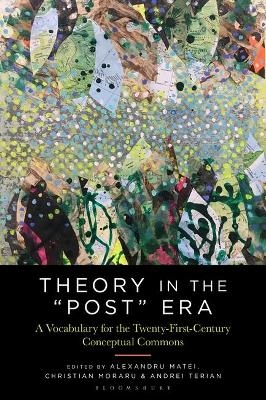
Theory in the "Post" Era
Bloomsbury Academic USA (Verlag)
978-1-5013-5895-1 (ISBN)
Theory in the "Post" Era brings together the work and perspectives of a group of Romanian theorists who discuss the morphings of contemporary theory in what the editors call the “post” era. Since the Cold War's end and especially in the third millennium, theorists have been exploring the aftermath - and sometimes just the “after” - of whole paradigms, the crisis or “passing” of anthropocentrism, the twilight of an entire ontological and cultural “condition,” as well as the corresponding rise of an antagonist model, of an “anti,” “meta,” or “neo” alternative, with examples ranging from “posthumanism” and “post-postmodernism” to “post-aesthetics,” “postanalog” interpretation or “digicriticism,” “post-presentism,” “post-memory,” “post-“ or “neo-critique,” and so forth.
It is no coincidence, the contributors to this volume argue, that this “post” moment is also a time when theory is practiced as a world genre. If theory has always been a “worlded” enterprise, a quintessentially communal, cross-cultural and international project, this is truer at present than ever. Perhaps more than other humanist constituencies, today's theorists work and belong in a theory commons that is transnational if still uneven economically, politically, and otherwise. Theory in the "Post" Era reports the results of Romanian theory experiments that join efforts made in other places to foster a theory for the “post” age.
Alexandru Matei is Professor of French at Transilvania University of Bra?ov, Romania, and Visiting Professor in the Anthropology Department of the Faculty of Sociology and Social Assistance of University of Bucharest, Romania. He is the author of books such as The Last Days of Literature’s Life: Enormous and Insignificant in Contemporary French Literature (2008), A Captivating Tribune: Television, Ideology, and Society in Socialist Romania (2013), and Jean Echenoz et la Distance intérieure (2012). Christian Moraru is Class of 1949 Distinguished Professor in the Humanities and Professor of English at University of North Carolina, Greensboro, USA. His recent publications are the monographs Cosmodernism: American Narrative, Late Globalization, and the New Cultural Imaginary (2011) and Reading for the Planet: Toward a Geomethodology (2015) and coedited essay collections such as The Planetary Turn: Relationality and Geoaesthetics in the Twenty-First Century (2015), Romanian Literature as World Literature (Bloomsbury, 2018), and Francophone Literature as World Literature (Bloomsbury, 2020). Andrei Terian is Vice Rector of Lucian Blaga University of Sibiu, Romania, and Professor of Romanian literature at the same institution. His latest books are the monographs G. Calinescu: The Fifth Essence (2009) and Exporting Criticism: Theories, Contexts, Ideologies (2013). He is also a main contributor to the General Dictionary of Romanian Literature (first edition: 2004-2009; second edition: 2016-2021) and Chronology of Romanian Literary Life: 1944-1989 (2010-2021).
Preface and Acknowledgments
Introduction: Toward a “Post” Vocabulary-- A Lab Report
Alexandru Matei, Transilvania University of Brasov, Romania; Christian Moraru, University of North Carolina, Greensboro, USA; and Andrei Terian, Lucian Blaga University of Sibiu, Romania
Part I: Aesthetics
1. Constructualism: Literary Evolution as Multiscalar Design
Teodora Dumitru, G. Calinescu Institute of Literary History and Theory of the Romanian Academy, Bucharest, Romania
2. Post-Aesthetics: Literature, Ontology, and Criticism as Diplomacy
Alexandru Matei, Transilvania University of Brasov, Romania
3. Eastethics: The Ideological Shift in Narratology
Alex Goldis, Babes-Bolyai University of Cluj-Napoca, Romania
4. Metapolitics: Recommitting Literature in the Populist Aftermath
Ioana Macrea-Toma, Central European University of Budapest, Hungary
5. Communality: Un-Disciplining Race, Class, and Sex in the Wake of Anti-“PC” Monomania
Andrei Terian, Lucian Blaga University of Sibiu, Romania
6. Anarchetype: Reading Aesthetic Form after “Structure”
Corin Braga, Babes-Bolyai University of Cluj-Napoca, Romania
Part II: Temporalities
7. Post-Synchronism: “Cultural Complex,” or Critical Theory’s Unfinished Business
Carmen Musat, University of Bucharest, Romania
8. Post-Presentism: The Past, the Passed, and “Now” as Critical Operator
Bogdan Cretu, Alexandru Ioan Cuza University of Iasi, Romania
9. Postfuturism: Contemporaneity, Truth, and the End of World Literature
Christian Moraru, University of North Carolina, Greensboro, USA
10. Post-Memory: The Labor of Critical Remembrance after Communism
Andreea Mironescu, Alexandru Ioan Cuza University of Iasi, Romania
11. Biofiction: Metamorphoses of Life-Writing across Criticism, Theory, and Literature
Laura Cernat, Independent Scholar
Part III: Critical Modes
12. Geocritique: Siting, Poverty, and the Global Southeast
Stefan Baghiu, Lucian Blaga University of Sibiu, Romania
13. Neocritique: Sherlock Holmes Investigates Literature
Mihai Iovanel, G. Calinescu Institute of Literary History and Theory of the Romanian Academy, Romania
14. Digicriticism: Profession On(the)Line
Adriana Stan, Sextil Puscariu Institute of Linguistics and Literary History of the Romanian Academy, Cluj-Napoca, Romania
15. Somatography: Writing as Incorporated Cognition, or the Body Knows More
Caius Dobrescu, University of Bucharest, Romania
16. Post-Canonicity: Curating World Literary Archives after Postmodernism
Cosmin Borza, Sextil Puscariu Institute of Linguistics and Literary History of the Romanian Academy, Cluj-Napoca, Romania
Bibliography
Contributors
Index
| Erscheinungsdatum | 24.09.2021 |
|---|---|
| Verlagsort | New York |
| Sprache | englisch |
| Maße | 152 x 229 mm |
| Gewicht | 671 g |
| Themenwelt | Geisteswissenschaften ► Philosophie ► Geschichte der Philosophie |
| Geisteswissenschaften ► Philosophie ► Philosophie der Neuzeit | |
| Geisteswissenschaften ► Sprach- / Literaturwissenschaft ► Anglistik / Amerikanistik | |
| Geisteswissenschaften ► Sprach- / Literaturwissenschaft ► Literaturwissenschaft | |
| Sozialwissenschaften | |
| ISBN-10 | 1-5013-5895-2 / 1501358952 |
| ISBN-13 | 978-1-5013-5895-1 / 9781501358951 |
| Zustand | Neuware |
| Informationen gemäß Produktsicherheitsverordnung (GPSR) | |
| Haben Sie eine Frage zum Produkt? |
aus dem Bereich


